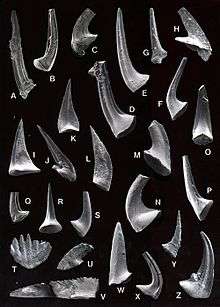Colaptoconus
| Colaptoconus Temporal range: 478.6–468.1 Ma | |
|---|---|
 | |
| D_E,F Colaptoconus quadraplicatus (Branson and Mehl) detail
Scanning electron microscope (SEM) photomicrographs of some representative conodont elements from the Gasconade, Roubidoux, and Jefferson City formations in southeastern Missouri. Illustrated specimens are reposited in the type collections of the Paleobiology Department, U.S. National Museum (USNM), Washington, D.C. 20560. D_E, Colaptoconus quadraplicatus (Branson and Mehl); posterolateral (D) and lateral (E) views of triplicatiform and quadraplicatiform elements, respectively; D, from sample JF-H, Jacks Fork section, X 110, USNM 498499; E, from sample JC-J, lower part of Jefferson City Dolomite at Jim's Creek section, X 64, USNM 498500. F, cf. Colaptoconus quadraplicatus (Branson and Mehl); shallowly grooved specimen, from sample JF-J at Jacks Fork section, X 90, USNM 498501. | |
| Scientific classification | |
| Kingdom: | Animalia |
| Phylum: | Chordata |
| Class: | †Conodonta |
| Genus: | †Colaptoconus (Kennedy, 1981) |
| Species | |
| |
| Synonyms | |
|
Glyptoconus Kennedy, 1981 (syn. Glyptoconus von Moellendorff, 1894)[1] | |
Colaptoconus is an extinct genus of conodonts.
References
- S. Desbiens, T. E. Bolton, and A.D. McCracken. 1996. Fauna of the lower Beauharnois Formation (Beekmantown Group, Lower Ordovician(, Grand île, Quebec. Canadian Journal of Earth Sciences 33(8):1132-1153
External links
- Colaptoconus at fossilworks.org (retrieved 15 July 2016)
This article is issued from Wikipedia - version of the 7/15/2016. The text is available under the Creative Commons Attribution/Share Alike but additional terms may apply for the media files.